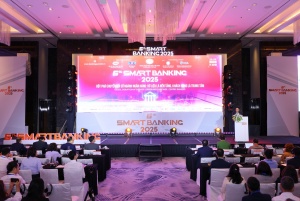INTERNATIONAL INVESTMENT
AND PORTAL
According to data released by the State Bank of Vietnam (SBV) at Smart Banking 2025, held in Hanoi on September 25, 98 per cent of customers have conducted transactions through digital channels. In a single day, the banking system has recorded more than 30 million inter-branch transactions, with a total value of approximately $40 billion.
Nguyen Hung, CEO of TPBank, noted that data is the bank’s most valuable asset but without proper utilisation, it holds little value.
“The biggest challenge today is how to harness data effectively to support banks’ decision-making. Data cleansing has become mandatory, supported by clear regulations, standards, and enforcement mechanisms to ensure analytical accuracy,” said Hung. “At TPBank and across the sector, data remains fragmented. We are prioritising the development of interconnected data systems, with sensible segmentation to democratise access, ensuring that everyone can use data while maintaining security and confidentiality.”
Hung added that in reality, every sound decision must be grounded in solid, market-based data.
“That’s why we are investing comprehensively in processes, systems, and human resource training to strengthen staff awareness of data’s importance, enrich this valuable resource, and train AI systems to maximise business performance,” he noted.
Major Dao Duc Trieu, secretary general at National Data Association, highlighted that one of the Party’s key policies has been to foster data connectivity and development.
“This vision has been concretised through major data-related policies, most notably Resolution No.57-NQ/TW on breakthroughs in science, technology, innovation, and national digital transformation, as well as Resolution No.214/NQ-CP, which sets out the government’s action plan to accelerate comprehensive data development for digital transformation,” he said. “These are strategic reforms that lay the foundation for building a data-driven economy and digital society in Vietnam.”
 Major Dao Duc Trieu, secretary general at National Data Association
Major Dao Duc Trieu, secretary general at National Data Association
Trieu added that going forward, the Ministry of Public Security and the National Data Centre will continue advising the Politburo to issue a new resolution on data infrastructure development and the data economy.
“The resolution is expected to define the scope and concept of the data economy and establish a national data architecture framework. This framework will be crucial for ministries, sectors, and localities to connect and share data systematically and effectively,” he noted.
“We will continue to strengthen the role of the National Data Centre in connecting public data, leveraging more than 230 existing sectoral databases, and promoting data-driven innovation to deliver socioeconomic development solutions,” added Trieu.
While the potential of data utilisation is evident, ensuring data security and safety remains a top priority. Pham Anh Tuan, director general of the SBV’s payment department, said the banking sector has made notable progress in digital transformation, such as raising awareness across the system, improving regulations, investing in infrastructure and technology, and adopting digital data.
“As of September, biometric information for 128.9 million customers had been verified, and the risk warning system has helped hundreds of thousands of customers avoid fraud, saving billions of USD,” he said.
Le Quang Ha, deputy director of Viettel Cyber Security, stressed the importance of pairing data utilisation with strong security measures.
“In the first nine months of this year, the company’s cybersecurity monitoring system detected 412 cases of information leaks and sales in Vietnam, including 3.4 billion detected data breach and sales actions. Hackers demanded nearly $1 million in ransom, quadruple the amount recorded in the same period in 2024,” said Ha.
“This demonstrates that while digital transformation and AI applications offer tremendous benefits, they also bring cybersecurity challenges. Data itself is a strategic asset, but because it can be replicated, it is harder to protect than other asset classes, increasing the risk of leakage. Moreover, over 40 per cent of data breaches originate from third parties, and 11 per cent from fourth parties, underscoring the complexity of data connectivity,” explained Ha.
 Le Quang Ha, deputy director of Viettel Cyber Security
Le Quang Ha, deputy director of Viettel Cyber Security
To accelerate digital transformation breakthroughs, economist Dr. Can Van Luc stressed the need to further complete the legal framework.
He urged regulators to swiftly issue guidelines for the Digital Technology Industry Law and the Personal Data Protection Law, advance an AI Law by 2026, and promote sandbox mechanisms for controlled testing and risk-taking.
“In reality, the banking sector is entering a period of intense digital transformation, with data serving as the foundation for enhancing competitiveness,” Luc stated. “This is not merely a technological issue but a long-term strategic agenda that requires synchronised investment in infrastructure, human capital, and legal frameworks. Only by treating data as a strategic asset and using it effectively can banks build trust, strengthen customer relationships, and unlock sustainable value in the digital era.”
Bui Tri Hung - Country manager, Mambu Vietnam
In the past, banks operated entirely on-premises, and customers relied on physical branches. Today, this behaviour has shifted almost entirely online. Regardless of whether a bank runs its systems on-premises or on the cloud, what matters to users is speed and seamless service.

Digital banks can now respond to feedback almost instantly, which is a necessity as expectations have soared. Over 80 per cent of customers expect real-time digital experiences, 89 per cent prefer fully online processes, and 74 per cent want services as smooth as those of leading tech firms.
Building a digital core banking system on software as a service is often cheaper and faster than migrating legacy infrastructure. Some banks have chosen to launch a complete digital bank rather than rely on traditional core banking to avoid high costs on licensing, infrastructure, and training costs. Vietnam’s banking landscape reinforces this shift. While state-owned banks maintain dominance through high current account saving accounts, fintechs and digital banks are rapidly capturing millions of customers excluded or underserved.
Digital core banking based on the cloud not only reduces the total cost of ownership to 50 per cent but most importantly the real value lies in agility: launching products faster, scaling instantly, and integrating more easily. One good example is 94/2025/ND-CP where the government is encouraging innovation through sandbox mechanisms, providing controlled testing spaces for fintechs and digital banks, giving early adopters a chance to lead and shape standards.
While the legal framework is still evolving, the direction is unmistakable: digital banking transformation is inevitable. As Vietnam continues its march towards a digital-first economy, banks that embrace composable and cloud-native technology will be best positioned to thrive. The message for the industry is clear: the time to change is now, and every bank has the opportunity to lead.
 Data is the new lifeblood of banking
Data is the new lifeblood of banking
Vietnam's banking sector is standing at the threshold of a data-driven revolution, where every transaction, every customer, and every insight could define the next decade of finance.
 Australia and Vietnam join forces to boost financial and digital innovation
Australia and Vietnam join forces to boost financial and digital innovation
The Australian Trade and Investment Commission (Austrade) signed an MoU with the Vietnam Banks Association (VNBA) on June 2, marking a significant step forward in enriching fintech collaboration between the two countries.
 AI giving Standard Chartered the edge in digital banking
AI giving Standard Chartered the edge in digital banking
Nguyen Ngoc Lan Anh, Chief Technology and Operations Officer at Standard Chartered Bank Vietnam, shares key insights on the benefits of AI in financial services, highlighting how Standard Chartered applies AI to drive innovation, boost efficiency, and enhance customer and employee experiences.



















